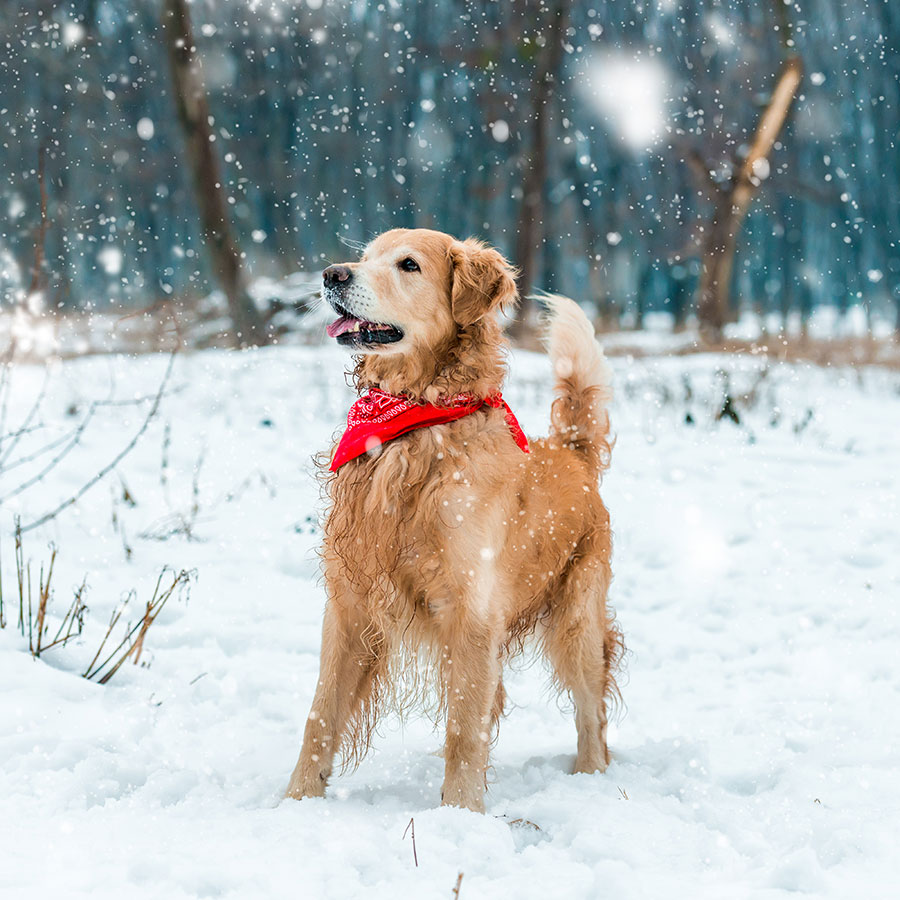Winter safety tips
To protect your pets during the cold winter months and holidays, Animal Protection and Control recommends the following safety advice. Much of this information can apply to any livestock in your care.
- Keep an eye on the temperature. When it falls below 20 degrees Fahrenheit, it's best to keep your pet indoors. Short-haired dogs, cats and puppies should be kept indoors when the temperature dips below 40 degrees Fahrenheit, or provided with protective clothing.
- Keep your pet's coat well groomed. Matted fur won't properly protect your pet from the cold.
- Check your garage and driveway for antifreeze. Antifreeze tastes sweet to pets, but most brands are poisonous if consumed. Should your pet ingest any amount of antifreeze, contact your veterinarian immediately. Chemical Deicers can also be hazardous, so wipe your pet off after a walk if they may have been used by someone in your neighborhood.
- Regularly check your pet's water to make sure it's not frozen. When your pet is outside, make sure there is plenty of fresh drinking water available. Animals can't burn calories without a fresh supply of water, and if they can't burn calories, they'll get cold. Also, use a tip-resistant, ceramic or hard plastic water bowl rather than a metal one, as your pet's tongue can stick and freeze to cold metal.
- Provide a dry, draft-free doghouse if you must keep your dog outside for any period of time. It should be large enough to allow your dog to sit and lay down comfortably but small enough to hold in its body heat. The floor should be raised a few inches off the ground and covered with cedar shavings or straw. The doghouse should be turned to face away from the wind, and the doorway should be covered with waterproof burlap or heavy plastic.
- Slap the hood of your vehicle before starting it. In their search to keep warm outdoors, cats often take refuge next to a warm car engine or tire.
- Compare the amount of exercise your dog receives during the colder months to warmer months. If your dog is indoors more at this time of year, it's probably getting less exercise and may need less food. However, if your pet is outside often in the winter months, it may need more food to burn the calories necessary to produce more body heat.
- Don’t feed your dog people food. Alcoholic beverages, candy, chocolate, turkey and stuffing, pork, fish, bones, just to name a few hazards...keep your pet on its regular diet. Lots of dogs come down with vomiting and diarrhea right after Thanksgiving and Christmas, some seriously ill. Another related hazard is the plastic six-pack beverage holders. Cut them up before throwing them away. This will also help the wildlife at the landfill (especially birds).
- Watch out for toxic plants, including Christmas rose, holly, mistletoe, philodendron, and dieffenbachia. Keep them out of your pets reach. You can call the ASPCA Animal Poison Control Center at 888-426-4435 for help if you pet eats something funny.
- Keep holiday paraphernalia away. Electric cords, tinsel, glass ornaments, candles, spray on-snow (some are non-toxic-read the label), ribbons, plastic or foil wrapping, etc. can be dangerous to your pet.
For more tips, visit www.aspcapro.org/resource/shelter-health-poison-control/top-5-holiday-dangers-pets and www.aspca.org/pet-care/general-pet-care/cold-weather-safety-tips.
Holiday safety tips
Wrapped presents: Gifts are a surprising source of toxicities during the holidays. If you are going to wrap any food (especially chocolate), dog treats, or dog toys, keep the items in a safe place and well out of your pet’s reach until they are ready to be opened. Pets have a keen sense of smell and will often unwrap presents early and eat all of the contents.
Snow globes: Some snow globes contain ethylene glycol, a highly toxic substance to all pets. If a snow globe is broken, either by a person or a pet, the sweet smell can attract a pet to lick it up, leading to a potentially fatal intoxication. Snow globes should be kept out of reach of pets.
Holiday food: Pets are often not shy about taking food that is left sitting out on counters or tables. Pets should be kept away from food preparation areas or places where food will be left out. A few of the more concerning common food exposures during the holidays are chocolate, bread dough, fruitcake and alcohol.
Medication: There are often a large number of visitors during the holiday season, and pets often get into medications that friends or family have brought with them. These exposures can be prevented with a little advance planning. People who are not used to having pets in the house can often be unaware of how curious they can be. Pets will often investigate suitcases and can get into pill vials or weekly pill minders. It is safer to have the visitors put their medication in a closed cabinet that is not accessible to pets. Be sure that when they take their medications that they do so behind a closed door, such as the bathroom, so that a dropped pill can be found before the pet has a chance to eat it. A prewritten list of the names, milligram strength, and number of pills that visitors have brought is very useful in an emergency situation as well.
Salt: Ice melt, homemade play dough, and salt-dough ornaments (even when dry) can all be a tempting salty treat for pets, but can cause life-threatening imbalances in the electrolytes.
